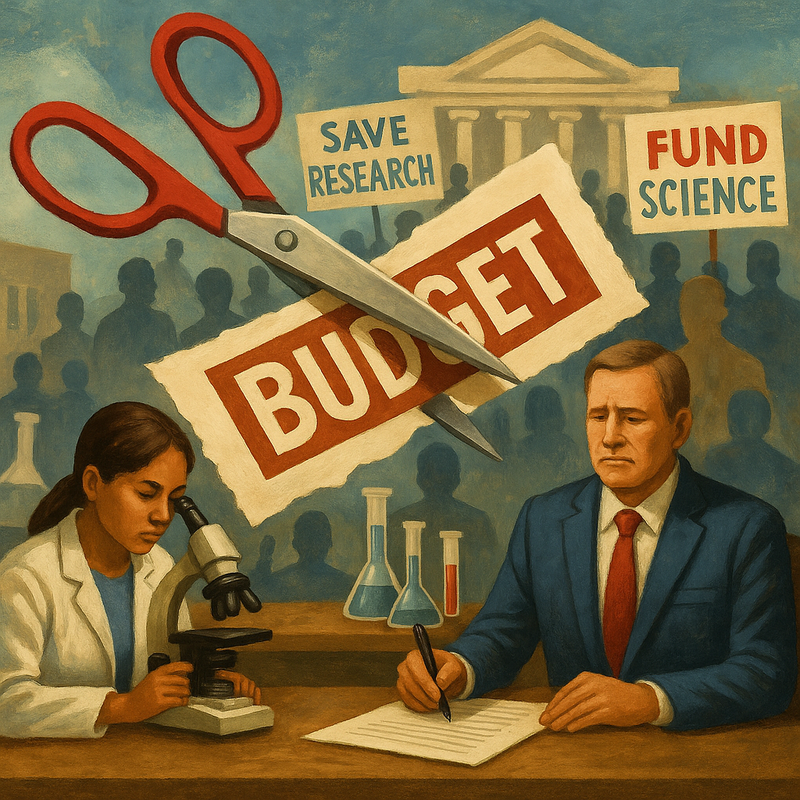Trump Proposes Unprecedented Budget Cuts to U.S. Science
Input
Modified
The Trump administration’s proposed federal budget includes unprecedented cuts to science funding Scientists and universities warn of severe domestic and global consequences The future of American research now hinges on Congressional negotiations and public pressure

In a move that has stunned researchers, university officials, and global observers alike, the Trump administration has put forward a proposed federal budget that, if passed, would represent the most significant reduction in science funding in modern U.S. history. The sweeping cuts span across a wide range of research institutions and disciplines, sending a clear signal: science is no longer a top priority in the eyes of the federal government.
The proposal would deeply reduce—or, in some cases, eliminate—funding for prominent scientific agencies and programs. The National Science Foundation (NSF), which supports most non-medical academic research across the U.S., would see a devastating cut of more than half of its annual budget. Similarly, the National Institutes of Health (NIH), which funds critical medical and health-related research, faces steep reductions that would force a halt to many active research programs. The Environmental Protection Agency (EPA), already under pressure in past years, would lose the majority of its scientific research division, severely limiting its capacity to study and respond to environmental threats.
This budget proposal represents a sharp reversal from the path the U.S. was on just a few years ago. Under the Biden administration, science was treated as a pillar of national policy. Budgets modestly increased for most science agencies, and the White House made public commitments to addressing climate change, fostering innovation, and ensuring American leadership in advanced technology. President Biden often emphasized that scientific investment was not just about discovery, but about securing economic prosperity and national security.
Unprecedented Cuts and Their Justification
Now, in what many researchers fear may mark the beginning of a long-term decline, the new budget proposes a radically different approach. The justification offered by the Trump administration focuses on limiting “non-essential” federal expenditures and redirecting resources toward other priorities, including defense, border control, and domestic industrial development. But the scientific community warns that the long-term cost of gutting research funding will far outweigh any short-term savings.
Within academia, the response has been swift and vocal. University administrators across the country have begun to issue statements condemning the proposed budget and warning of catastrophic impacts if the cuts are implemented. One of the biggest concerns is the potential collapse of the research pipeline—from undergraduate and graduate training to postdoctoral programs and independent research careers. If federal funds disappear, universities will be unable to support the research infrastructure that underpins their science departments.
The effect wouldn’t just be felt in the halls of academia. The private sector, especially industries reliant on scientific and technological innovation, also stands to lose. Pharmaceutical companies, biotech firms, clean energy startups, and semiconductor manufacturers all benefit indirectly from basic research conducted at universities and federally funded labs. Without this pipeline of foundational science, the entire innovation ecosystem is at risk.
Furthermore, many prominent scientists and policy analysts are raising alarm about the international consequences of the cuts. The U.S. has long enjoyed a leadership position in global science, attracting top minds from around the world and driving collaborative research on some of the most pressing challenges of our time. That position is now in jeopardy. Countries such as Germany, Canada, China, and members of the European Union have already begun adjusting their science recruitment strategies to capitalize on America's retreat. Some have even launched special funding initiatives aimed specifically at luring American scientists away from what they now see as an unstable funding environment.

Ripple Effects Across Academia, Industry, and Global Science
The brain drain is not merely a theoretical risk. Many early-career scientists are openly questioning their future in the U.S. A number of postdoctoral researchers and junior faculty members have expressed their intention to seek positions abroad, where funding is more secure and governments have demonstrated a long-term commitment to research.
The legal and political backlash has already begun. A group of major research universities has filed a lawsuit against the administration over changes to the federal policy governing reimbursement for indirect research costs. The new policy caps reimbursement at 15%, a drastic reduction from historical norms, which institutions argue makes it financially unfeasible to conduct federally funded research. This is likely to be just one of many legal challenges, as universities fight to preserve their ability to sustain research and remain competitive.
What makes the situation even more troubling is the degree of uncertainty. Budget proposals are subject to Congressional negotiation, but political analysts note that science has lost much of its bipartisan support in recent years. Once a largely non-partisan issue, science funding has increasingly become entangled in ideological debates about climate policy, regulation, and federal overreach. This growing polarization means that science advocates can no longer count on cross-aisle support to rescue critical funding lines.
In some parts of the country, public opinion is divided. While many communities—especially those near large research universities or tech hubs—are deeply concerned, other segments of the population see the cuts as part of a broader effort to rein in federal spending and prioritize domestic issues. Conservative media outlets have framed the move as a necessary rebalancing, pointing to what they describe as bloated bureaucracies and politically biased science agendas.
Nevertheless, it’s difficult to overstate the magnitude of the potential impact. The elimination of funding for certain programs means that entire fields of research could vanish from the American scientific landscape. Studies on climate change, renewable energy, biodiversity, and pandemic preparedness are among the areas most at risk. These are not just academic questions—they are issues with direct consequences for public health, economic resilience, and global security.
The scientific community is bracing for what may be a prolonged period of uncertainty and retrenchment. Many are organizing lobbying efforts, public awareness campaigns, and policy briefings in an attempt to rally support and sway key decision-makers in Congress. National scientific societies, such as the American Association for the Advancement of Science, have called on their members to advocate at both state and federal levels.
The Fight to Preserve American Science
The big question now is whether this is a temporary setback or the beginning of a long-term shift in the U.S. approach to science. Some observers fear that, if enacted, the Trump administration’s budget would fundamentally alter the landscape of American science for a generation or more. The research community, they argue, can survive lean years—but it cannot thrive in an environment where science itself is treated as expendable.
In the coming months, the debate over the budget will play out in Congress. But the ripple effects are already being felt across labs, campuses, and international borders. The U.S. scientific enterprise—once the envy of the world—now faces a defining moment. Whether it can weather the storm and emerge resilient will depend not only on legislative outcomes but on the willingness of the nation to recommit to a future built on discovery, evidence, and innovation.





















